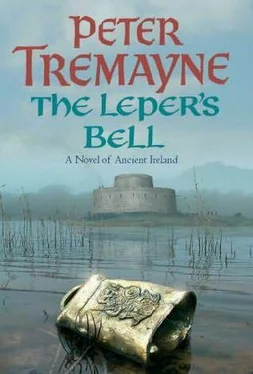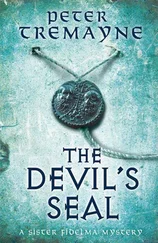Peter Tremayne - The Leper's bell
Здесь есть возможность читать онлайн «Peter Tremayne - The Leper's bell» весь текст электронной книги совершенно бесплатно (целиком полную версию без сокращений). В некоторых случаях можно слушать аудио, скачать через торрент в формате fb2 и присутствует краткое содержание. Жанр: Исторический детектив, на чешском языке. Описание произведения, (предисловие) а так же отзывы посетителей доступны на портале библиотеки ЛибКат.
- Название:The Leper's bell
- Автор:
- Жанр:
- Год:неизвестен
- ISBN:нет данных
- Рейтинг книги:4 / 5. Голосов: 1
-
Избранное:Добавить в избранное
- Отзывы:
-
Ваша оценка:
- 80
- 1
- 2
- 3
- 4
- 5
The Leper's bell: краткое содержание, описание и аннотация
Предлагаем к чтению аннотацию, описание, краткое содержание или предисловие (зависит от того, что написал сам автор книги «The Leper's bell»). Если вы не нашли необходимую информацию о книге — напишите в комментариях, мы постараемся отыскать её.
The Leper's bell — читать онлайн бесплатно полную книгу (весь текст) целиком
Ниже представлен текст книги, разбитый по страницам. Система сохранения места последней прочитанной страницы, позволяет с удобством читать онлайн бесплатно книгу «The Leper's bell», без необходимости каждый раз заново искать на чём Вы остановились. Поставьте закладку, и сможете в любой момент перейти на страницу, на которой закончили чтение.
Интервал:
Закладка:
Eadulf turned and smiled softly.
‘I never knew why your festival of Samhain should be considered as marking the start of the year.’
‘Isn’t it natural to sit, rest and meditate before one rises up into action? The crops rest, the trees rest, the people rest in their houses awaiting the first sign of the spring. As a baby rests in the darkness of its mother’s womb, gaining strength, before plunging into the world.’
‘You cannot be advocating that we should be doing nothing but waiting for the start of spring.’ Eadulf leant back against the window and brushed a hand against the hair hanging over his forehead. ‘Are we to do nothing until the feast that marks the ewes’ coming into milk? There are times, such as this, when we must eschew contemplation and deny ourselves that rest.’
Almost as he said it, he realised it was not a good thing to say in the circumstances. Fidelma seemed to wince for a moment, as if struck by a physical pain, and he stepped quickly across to her with his hands held out. She did not take them, but turned her head away, leaving him frozen for a moment in the gesture. Then she sniffed and rose, brushing by him.
‘You are right, Eadulf. Now is not the time for doing nothing.’
‘I did not mean-’
‘The refectory bell will sound in a moment,’ she went on, ignoring his hurt and guilty look. ‘Time to make a decision on what we should do now.’
Eadulf cleared his throat, wondering whether to challenge her behaviour, then he dropped his hands to his side and shrugged.
‘As I see it, we can move west hoping that we might catch up with the little leper,’ Fidelma said.
‘I would agree that we could do so,’ Eadulf replied. ‘However, do we really know where he was heading, even if we accept that he was the strange figure seen by Caol, bringing the message to Sárait? What hope have we of finding this Forindain if we only know a general direction? He could go anywhere, not necessarily to the fair. It might be like looking for a needle in a stack of hay. What if he only said he was going west to Brother Buite? What if he went south, or north, or even returned east? I agree that we should perhaps follow any lead, however fragile and faint, but we might waste valuable time on this course of action.’
Fidelma looked thoughtful. ‘Is there an alternative?’
‘I think we could admit that this trail has gone cold.’
Fidelma sniffed slightly. ‘There is always an alternative to any action in life. Life is governed by the fact that when a decision is made there are always two paths to choose from.’
‘What else, then?’ Eadulf pressed, perhaps a little aggressive now in his feeling of irritated hurt.
The refectory bell began to toll, summoning the brethren to the evening meal. Fidelma turned towards the door without answering.
‘A moment!’ snapped Eadulf.
Fidelma turned back to him, surprised at the sudden anger in his voice.
‘I think,’ Eadulf said, his voice suddenly cold, his tone measured, ‘that you should tell me what you intend to do before we join the others. You should tell me, even if you have no respect for me as your husband, for the sake of the fact that I am the father of Alchú, who is my son as well as yours.’
Fidelma flushed in annoyance. For a moment she said nothing as a strange combination of guilt and anger welled in her, rose up until her tongue was ready to articulate it. Then something seemed to spread like a cooling tide through her mind. Her guilt suddenly outweighed her impulse to anger.
She realised that the fault lay with her. She had taken Eadulf for granted and she had used arrogance to disguise her feelings of guilt for fear of showing them. Eadulf was right. Had she pushed the good nature of the Saxon too far? She stared at his resolute features. They seemed so alien now, so cold and impassive. She had never seen him look so controlled and distant before.
‘Eadulf…’ she began, but found her lips suddenly dry.
He waited a moment.
‘Well?’ he demanded harshly. ‘What do you intend? Am I to be told or do you prefer to make decisions without informing me? Don’t let it concern you. I am used to those at Cashel nudging one another, smirking and treating me with disrespect. There goes the foreigner! It is right that he is treated like a servant for he is not worthy of marriage to our princess.’
Fidelma stared at him, shocked.
‘Who says this about you?’ she demanded after a pause.
Eadulf’s features formed into a sneer. She had never seen him like this before.
‘Are you claiming that you are blind to what happens at Cashel? Are you deaf to the whispers in the corridors of your brother’s palace? It is obvious that I am not thought worthy of you and you have often demonstrated that you share that opinion. I am considered…’
The angry words faded away as he failed to find suitable ones to express the months of built-up frustration and anger that lay within him.
Fidelma stood still, watching him. She suddenly felt that he had become a stranger to her. She was shocked by his suppressed passion. He stared back, his mouth a thin line, waiting for her to react. Finally, she sighed deeply.
‘I was going to suggest that we continue west until we reach Cnoc Loinge, the Hill of the Ship, to see if we can learn anything further about the dwarf Forindain,’ she said quietly.
‘That,’ replied Eadulf in a tight voice, ‘is acceptable to me.’
He brushed quickly by her and left her staring in confusion after him.
Chapter Six
The next morning, Fidelma turned her horse westward. She had hardly spoken to Eadulf since their harsh words of the night before and a long, uncomfortable silence hung between them. To Capa she had merely said: ‘I am in a mind to go to Cnoc Loinge, the Hill of the Ship. It will take us a few hours out of our journey, that is all.’
Capa had protested.
There is nothing there, lady.’
‘Except a fair that I have a mind to see.’
Capa raised his eyebrows in surprise but said nothing further. After a while, Fidelma decided to unbend and confided in Capa and his men what the purpose of going to Cnoc Loinge was.
Capa was clearly not enthusiastic.
‘You say that this dwarf, Forindain, might be the messenger that lured my sister-in-law from the palace? A leper? And we are going to Cnoc Loinge to see a band of travelling players among whom this Forindain might be hiding? It sounds a waste of time to me.’
‘Nevertheless,’ Fidelma assured him, ‘that is why we are going there.’
Capa glanced at Eadulf, who had remained silent. It was clear that he recognised the unease between them. He regarded them with a troubled expression but said no more.
The distinctively shaped hill lay scarcely five kilometres from the abbey of Imleach. It was a pleasant and easy ride through wooded countryside until they came to the settlement nestling under the long, narrow hill. But just before they reached their destination, Eadulf saw that several travellers were joining the road. Soon the track was crowded and they had to pick their way among all manner of pedestrians, riders and those driving carts drawn by sturdy donkeys. It was clear that they were all heading for the fair, and when they reached the settlement they became aware of festivities taking place.
Apart from the wooden buildings of the village, there were stalls and tents erected on the main green, an area called the faithche that was set aside for the purpose. Fidelma knew that the smaller fairs throughout the country were presided over by the local chieftain, who assigned certain people to clear away the brambles and rubbish from the area on which the fair was to be held. Fences and mounds marked out the ground on which stalls were erected, and there was also an area set aside for sports such as jumping and running, and displays of weaponry and wrestling. To one side, she could see a cluichi mag had been prepared. This was a grassy level, where the ancient game of camán or hurling would be played. A local fair like this was called an oirecht as as opposed to the major festivals of the Féis.
Читать дальшеИнтервал:
Закладка:
Похожие книги на «The Leper's bell»
Представляем Вашему вниманию похожие книги на «The Leper's bell» списком для выбора. Мы отобрали схожую по названию и смыслу литературу в надежде предоставить читателям больше вариантов отыскать новые, интересные, ещё непрочитанные произведения.
Обсуждение, отзывы о книге «The Leper's bell» и просто собственные мнения читателей. Оставьте ваши комментарии, напишите, что Вы думаете о произведении, его смысле или главных героях. Укажите что конкретно понравилось, а что нет, и почему Вы так считаете.











